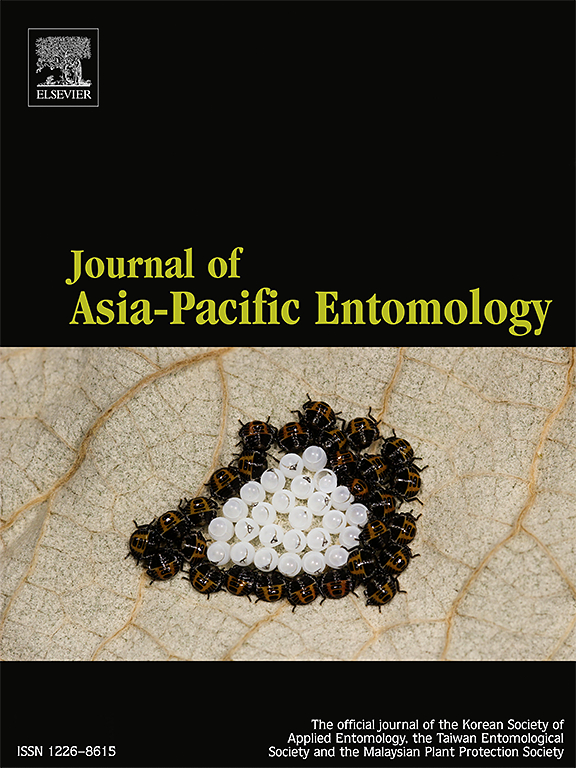稻田狼蛛的人工饲料:生存、发展及其对大规模饲养的启示
IF 1.3
3区 农林科学
Q3 ENTOMOLOGY
引用次数: 0
摘要
蜘蛛在农业生态系统的生物防治中起着至关重要的作用。然而,由于缺乏营养完整的人工饲料,大规模饲养蜘蛛以进行生物防治受到了阻碍。本试验研究了在纯人工饲料饲养下稻田狼蛛的生存、发育和生长情况。该日粮主要由鸡蛋、蜂蜜、酵母粉配制,并添加必需多不饱和脂肪酸(PUFAs);花生四烯酸和二十碳五烯酸)。结果与以果蝇为食的蜘蛛进行了比较,或者在发育和大小方面,与实地收集的个体进行了比较(使用文献数据和同步采样)。由于果蝇组的死亡率极高(97%,主要是蜕皮失败),比较主要局限于存活和早期。与果蝇相比,人工饮食显著提高了果蝇的存活率,这可能得益于PUFA的加入。然而,显著的死亡率(~ 29%)是由于饮食的高粘度引起的滞留。与野外蜘蛛相比,人工饲养的蜘蛛发育较慢,成年后体型较小,雌性蜘蛛体型缩小更明显。在人工饮食中,雌性的发育速度也比雄性慢。这些发现强调了人工饲料营养多样性对提高大规模饲养效率和推进可持续生物防治策略的必要性。本文章由计算机程序翻译,如有差异,请以英文原文为准。

Artificial diet for the paddy wolf spiders Pardosa pseudoannulata: Survival, Development, and Implications for mass rearing
Spiders play a vital role in biological control within agricultural ecosystems. However, mass rearing of spiders for biocontrol is hindered by the lack of nutritionally complete artificial diets. This study evaluated the survival, development, and growth of the paddy wolf spider Pardosa pseudoannulata, reared on a pure artificial diet. The diet was formulated primarily from chicken eggs, honey, yeast powder, and supplemented with essential polyunsaturated fatty acids (PUFAs; arachidonic and eicosapentaenoic acid). Results were compared to spiders fed fruit flies or, for development and size, to field-collected individuals (using literature data and concurrent sampling). Due to extremely mortality (>97 %, primarily molting failure) in the fruit fly group, comparisons were limited mainly to survival and early instars. The artificial diet significantly promoted survival compared to fruit flies, likely aided by PUFA inclusion. However, notable mortality (∼29 %) occurred due to entrapment caused by the diet’s high viscosity. Compared to field spiders, individuals on the artificial diet exhibited slower development and smaller adult body size, with the size reduction being more pronounced in females. Females also developed slower than males on the artificial diet. These findings highlight the necessity of nutrient diversity in artificial diets to improve mass rearing efficiency and advance sustainable biocontrol strategies.
求助全文
通过发布文献求助,成功后即可免费获取论文全文。
去求助
来源期刊

Journal of Asia-pacific Entomology
Agricultural and Biological Sciences-Insect Science
CiteScore
2.70
自引率
6.70%
发文量
152
审稿时长
69 days
期刊介绍:
The journal publishes original research papers, review articles and short communications in the basic and applied area concerning insects, mites or other arthropods and nematodes of economic importance in agriculture, forestry, industry, human and animal health, and natural resource and environment management, and is the official journal of the Korean Society of Applied Entomology and the Taiwan Entomological Society.
 求助内容:
求助内容: 应助结果提醒方式:
应助结果提醒方式:


